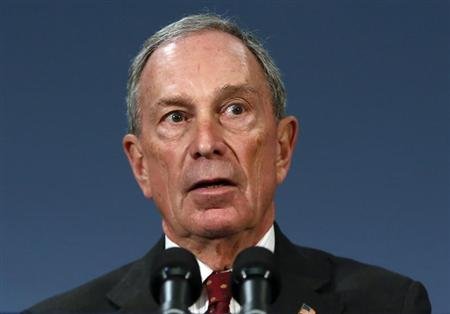
New York Mayor Michael Bloomberg on Monday proposed requiring that cigarettes be hidden from view in retail stores as a means to reduce smoking in what he said would be the first law of its kind in the United States.
Bloomberg plans to introduce to the City Council on Wednesday two bills that would require retailers to keep cigarettes in a drawer, behind a curtain or in some other concealed location. Some retail trade groups and tobacco companies criticized the proposed display ban as an unnecessary burden.
Bloomberg, a former smoker, is accustomed to industry opposition from previous measures to improve the health of New Yorkers, including bans on smoking in most offices, restaurants, bars, parks and on beaches.
Bloomberg has also taken steps to curtail the use of trans fats and salt in the city's restaurants. Last week a court unexpectedly struck down his attempt to limit the size of sugary drinks, in part because it did not go through the City Council. The city is appealing that ruling.
"These laws would protect New Yorkers, especially young and impressionable New Yorkers, from pricing, discounts and exposure to in-store displays that promote tobacco products," Bloomberg told a news conference at a city hospital.
"Such displays suggest that smoking is a normal activity and they invite young people to experiment with tobacco. This is not a normal activity," he said.
Stores would still be allowed to advertise and display pricing information but the actual tobacco products would only be visible during a sale or restocking.
Under current federal and state laws, cigarettes must be accessible only to a store's cashiers, and in many city stores they are prominently stacked on a wall behind the cash register.
The proposal would also increase penalties on stores that illegally resell cigarettes smuggled in from states with lower tobacco taxes, which Bloomberg said cost the city $30 million in lost tax revenue every year.
Over the last 18 months, inspectors visiting 1,800 cigarette retailers found 46 percent were selling untaxed or unstamped tobacco products, city officials said. New York City cigarettes are the most expensive in the nation at around $12 or $13 a pack after federal, state and city taxes.
The legislation would also prohibit retailers from redeeming discount coupons on tobacco sales.
The Food Industry Alliance of New York State, a trade group representing groceries and convenience stores, said the display law would be an unnecessary additional and potentially costly burden on retailers without any proven effect.
"I'm not a proponent of smoking. I am a proponent of retailers who are licensed to sell a legal product being able to do so without undue government interference," said Michael Rosen, the alliance's vice president for government relations.
Altria -- the parent company of Philip Morris USA, the nation's largest cigarette manufacturer -- also said it opposed the display ban and that it should be left to the U.S. Food and Drug Administration to regulate tobacco sales.
"We believe it goes too far," said David Sutton, an Altria spokesman.
The company still needed to see the details of the legislation but suspected it could breach free speech rights, Sutton said.
Bloomberg expected to have the council's support, although a vote was not expected immediately, a spokeswoman for the mayor said.
Christine Quinn, the council speaker and a leading candidate to replace Bloomberg in the November election, supported the goals of the bills but needed to review details before commenting further, a council spokeswoman said.
Bloomberg's previous bans on smoking in public places have corresponded with a decline in the number of New Yorkers who smoke, from 21.5 percent in 2002 to 14.8 percent in 2011, according to the city's health department.
Smoking remains the leading preventable cause of death among New Yorkers, the department says.